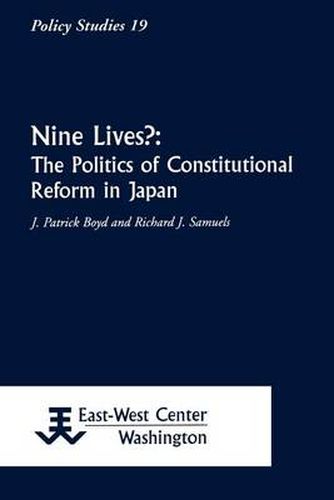Readings Newsletter
Become a Readings Member to make your shopping experience even easier.
Sign in or sign up for free!
You’re not far away from qualifying for FREE standard shipping within Australia
You’ve qualified for FREE standard shipping within Australia
The cart is loading…






Japan is a vibrant democracy, but its citizens have neither been given-nor have they taken-responsibility for authoring their own constitution. In 1889 the Emperor Meiji, supported by a group of oligarchs, bestowed an autocratic constitution upon his subjects. Then, in 1947, the U.S. occupation forces imposed a democratic constitution on the defeated citizens of postwar Japan. While this document has been the persistent object of intense debate, it has never been amended. But public opinion has shifted in favor of revision. Both the ruling Liberal Democratic Party (LDP) and the main opposition party, the Democratic Party of Japan (DPJ), are preparing constitutional drafts, and Japan is in the midst of one of the most consequential tests of its democratic institutions. Although the contemporary revision debate encompasses a number of weighty issues, including the role of the emperor and basic rights of citizens, one passage in particular continues to cast a shadow over the entire enterprise: Article Nine, the famous peace clause renouncing the possession and use of force for settling international disputes. Long the primary target of revisionist fervor, Article Nine was at the center of the first serious revision debate in the 1950s and controversies arising from its application again helped to ignite the contemporary revision movement after the Gulf War in 1991. Seen variously as an impediment to national autonomy, national muscularity, and national honesty, Article Nine has been continuously reinterpreted as the domestic and international political landscapes have shifted. This study examines why Article Nine has survived without amendment for so long, why it has returned to the political agenda with such force in recent years, and how debate over its revision will affect Japanese domestic politics and foreign policy.
$9.00 standard shipping within Australia
FREE standard shipping within Australia for orders over $100.00
Express & International shipping calculated at checkout
Japan is a vibrant democracy, but its citizens have neither been given-nor have they taken-responsibility for authoring their own constitution. In 1889 the Emperor Meiji, supported by a group of oligarchs, bestowed an autocratic constitution upon his subjects. Then, in 1947, the U.S. occupation forces imposed a democratic constitution on the defeated citizens of postwar Japan. While this document has been the persistent object of intense debate, it has never been amended. But public opinion has shifted in favor of revision. Both the ruling Liberal Democratic Party (LDP) and the main opposition party, the Democratic Party of Japan (DPJ), are preparing constitutional drafts, and Japan is in the midst of one of the most consequential tests of its democratic institutions. Although the contemporary revision debate encompasses a number of weighty issues, including the role of the emperor and basic rights of citizens, one passage in particular continues to cast a shadow over the entire enterprise: Article Nine, the famous peace clause renouncing the possession and use of force for settling international disputes. Long the primary target of revisionist fervor, Article Nine was at the center of the first serious revision debate in the 1950s and controversies arising from its application again helped to ignite the contemporary revision movement after the Gulf War in 1991. Seen variously as an impediment to national autonomy, national muscularity, and national honesty, Article Nine has been continuously reinterpreted as the domestic and international political landscapes have shifted. This study examines why Article Nine has survived without amendment for so long, why it has returned to the political agenda with such force in recent years, and how debate over its revision will affect Japanese domestic politics and foreign policy.